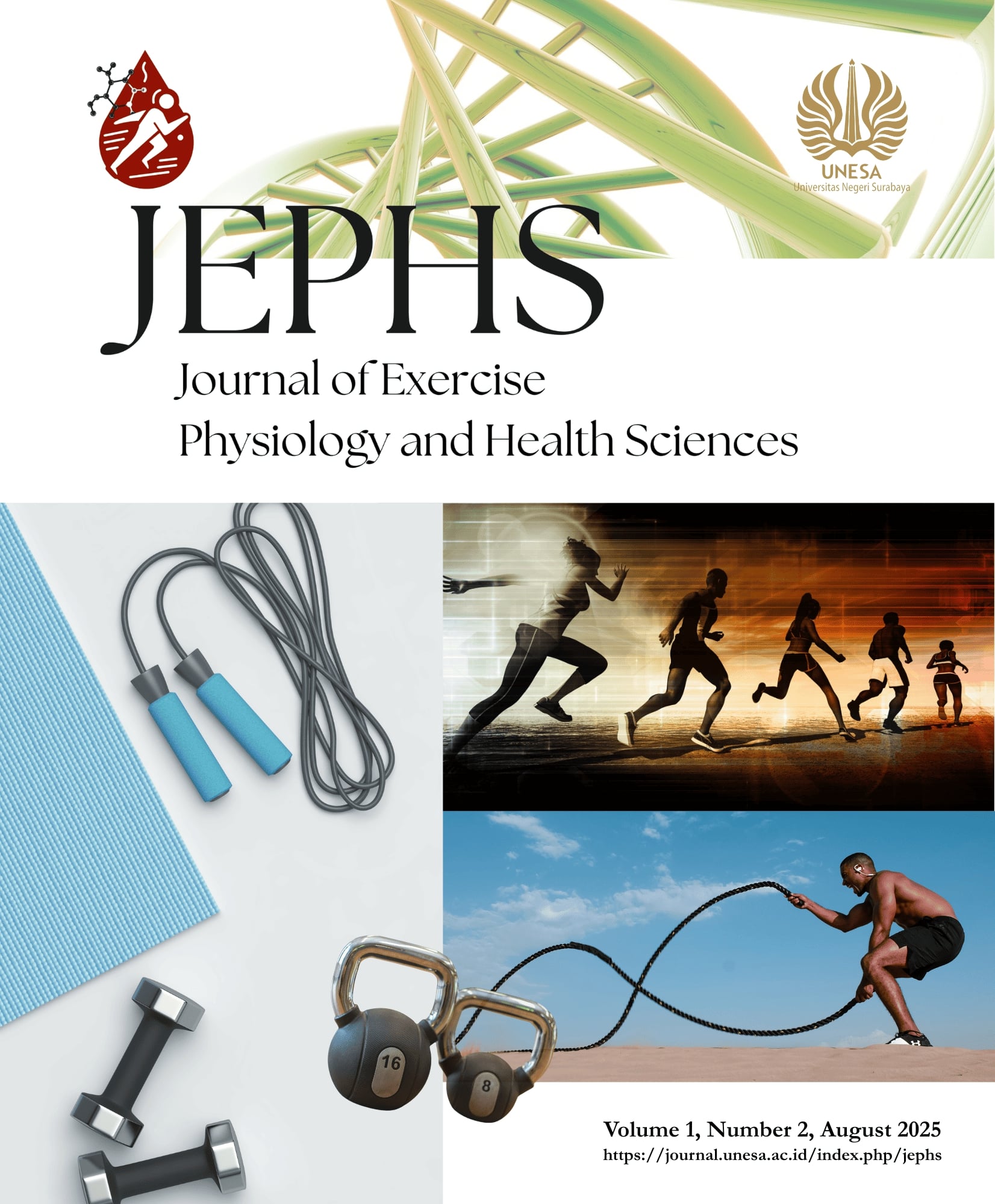Improving Cardiorespiratory and Muscular Endurance in Futsal Extracurricular Participants the Impact of a Four Week Interval Training Program
Keywords:
Futsal, HIIT, Cardiorespiratory Endurance, Muscular Endurance, VO2maxAbstract
The present study investigated the effect of a four-week high-intensity interval training (HIIT) protocol on increasing cardiorespiratory and muscle endurance in futsal extracurricular activities. There were 40 students aged between 15-20 years with both sexes, who were randomly assigned to either an intervention or control group, which received their routine training schedule compared to the HIIT program, respectively. Cardiorespiratory endurance was quantified using a submaximal treadmill test to estimate VO2max, while muscular endurance was assessed with push-up and sit-up tests. Results indicated that the intervention group experienced significant improvements in VO2max (from 45.2 ± 4.1 to 50.3 ± 4.5 mL/kg/min, p < 0.001) and in both push-up (from 15.2 ± 3.4 to 22.5 ± 4.1 repetitions, p < 0.001) and sit-up tests (from 20.1 ± 4.2 to 28.3 ± 5.0 repetitions, p < 0.001). On the other hand, the control group showed no significant differences in any of the parameters evaluated. The findings suggest that a clearly structured HIIT program is effective in improving both cardiorespiratory and muscular endurance in futsal players and that it has immense potential as an effective training modality for attaining maximal athletic performance in sports involving intermittent high-intensity efforts. The results of this study are valuable for futsal as well as other sport categories' trainers and coaches who wish to improve physical characteristics of sportsmen. The long-term consequences as well as physiological rationale of HIIT on endurance performance need to be explored through further studies.
References
1. Mendes D, Travassos B, Carmo JM, Cardoso F, Costa I, Sarmento H. Talent Identification and Development in Male Futsal: A Systematic Review. Vol. 19, International Journal of Environmental Research and Public Health. 2022.
2. Hostrup M, Bangsbo J. Performance Adaptations to Intensified Training in Top-Level Football. Vol. 53, Sports Medicine. 2023.
3. Naser N, Ali A, Macadam P. Physical and physiological demands of futsal. Vol. 15, Journal of Exercise Science and Fitness. 2017.
4. Atakan MM, Li Y, Koşar ŞN, Turnagöl HH, Yan X. Evidence-based effects of high-intensity interval training on exercise capacity and health: A review with historical perspective. Vol. 18, International Journal of Environmental Research and Public Health. 2021.
5. Poon ETC, Siu PMF, Wongpipit W, Gibala M, Wong SHS. Alternating high-intensity interval training and continuous training is efficacious in improving cardiometabolic health in obese middle-aged men. J Exerc Sci Fit. 2022;20(1).
6. Aziz AR, Tan B, Teh KC. Physiological responses during matches and profile of elite pencak silat exponents. Vol. 1, Journal of sports science & medicine. 2002. p. 147–55.
7. Torma F, Gombos Z, Jokai M, Takeda M, Mimura T, Radak Z. High intensity interval training and molecular adaptive response of skeletal muscle. Vol. 1, Sports Medicine and Health Science. 2019.
8. Joyner MJ, Casey DP. Regulation of increased blood flow (Hyperemia) to muscles during exercise: A hierarchy of competing physiological needs. Physiol Rev. 2015;95(2).
9. Yu H, Zhao X, Wu X, Yang J, Wang J, Hou L. High-intensity interval training versus moderate-intensity continuous training on patient quality of life in cardiovascular disease: a systematic review and meta-analysis. Sci Rep. 2023;13(1).
10. Lane AM, Beedie CJ, Devonport TJ, Friesen AP. Considerations of control groups: Comparing active-control with no treatment for examining the effects of brief intervention. Sports. 2021;9(11).
11. Ache-Dias J, Dellagrana RA, Teixeira AS, Dal Pupo J, Moro ARP. Effect of jumping interval training on neuromuscular and physiological parameters: A randomized controlled study. Applied Physiology, Nutrition and Metabolism. 2015;41(1).
12. Spyrou K, Freitas TT, Marín-Cascales E, Alcaraz PE. Physical and Physiological Match-Play Demands and Player Characteristics in Futsal: A Systematic Review. Vol. 11, Frontiers in Psychology. 2020.
13. Elliott JM, McCullick BA. Exceptional adaptability in collegiate coaching. Sports Coaching Review. 2019;8(3).
 Abstract views: 135
,
Abstract views: 135
, PDF Downloads: 143
PDF Downloads: 143





